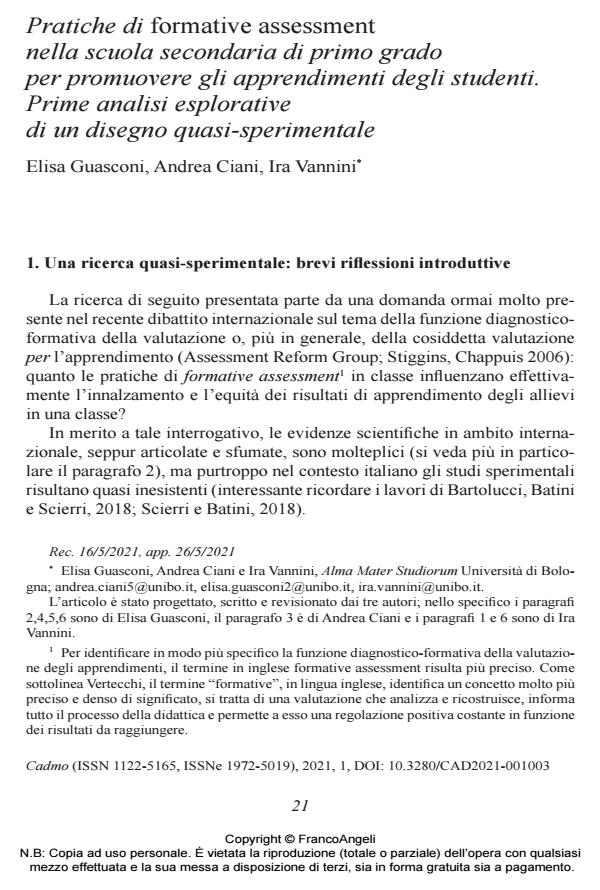Formative assessment prac¬tices in lower secondary school to promote students’ learning. First ex¬ploratory analyzes of a quasi-experimental design
Journal title CADMO
Author/s Elisa Guasconi, Andrea Ciani, Ira Vannini
Publishing Year 2021 Issue 2021/1
Language Italian Pages 25 P. 21-45 File size 319 KB
DOI 10.3280/CAD2021-001003
DOI is like a bar code for intellectual property: to have more infomation
click here
Below, you can see the article first page
If you want to buy this article in PDF format, you can do it, following the instructions to buy download credits

FrancoAngeli is member of Publishers International Linking Association, Inc (PILA), a not-for-profit association which run the CrossRef service enabling links to and from online scholarly content.
The article presents the results of a three-year research project aimed at investigating the effectiveness of formative assessment practices in classroom on middle school students’ reading and mathematical abilities. In line with the debate on formative assessment, practices and indicators of the skills to be measured were identified: they derived from the recent most acknowledged construct. A quasi-experimental research design was planned: a group of lower secondary school teachers of the same class experimented with formative as¬sessment practices with their students while supported with in-service training activities followed by the researchers. Pupils of the parallel classes belonging to the same institution constituted the control group. A measurement of math and comprehension abilities was conducted at the beginning and the end of the experimentation through standardized tests; students’ perceptions of the teach¬ing-learning process were collected through administering a questionnaire. Data show significant differences between the two groups’ learning achieve¬ments, especially in math abilities. The most comprehensive interpretation of these results leads us to consider the explorative feature of the study: indeed, several factors have affected the internal validity of the experimentation. At the same time, the research’s design limits offer a relevant opportunity to reflect on the need to find a more precise definition of the hypothesis for future studies.
Keywords: successful teaching, formative assessment practices, students’ achievements, lower secondary school, quasi-experimental research design.
Elisa Guasconi, Andrea Ciani, Ira Vannini, Pratiche di formative assessment nella scuola secondaria di primo grado per promuovere gli apprendimenti degli studenti. Prime analisi esplorative di un disegno quasi-sperimentale in "CADMO" 1/2021, pp 21-45, DOI: 10.3280/CAD2021-001003